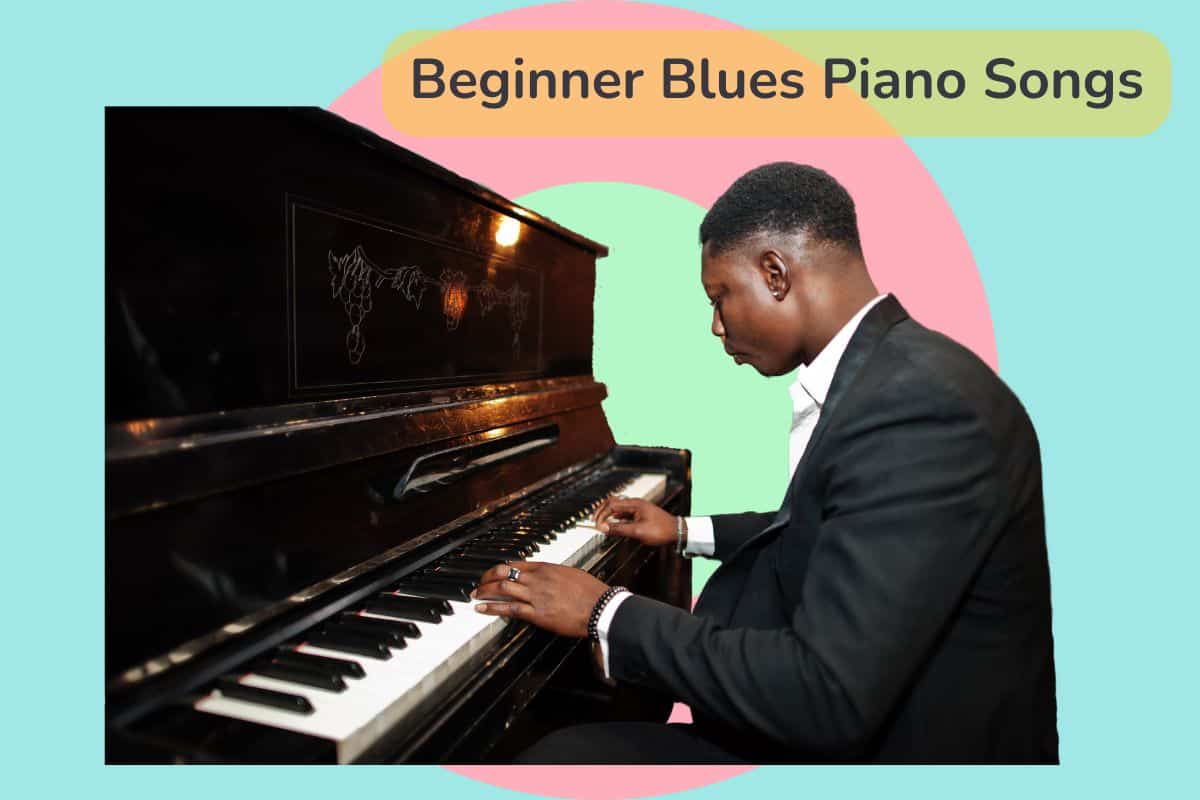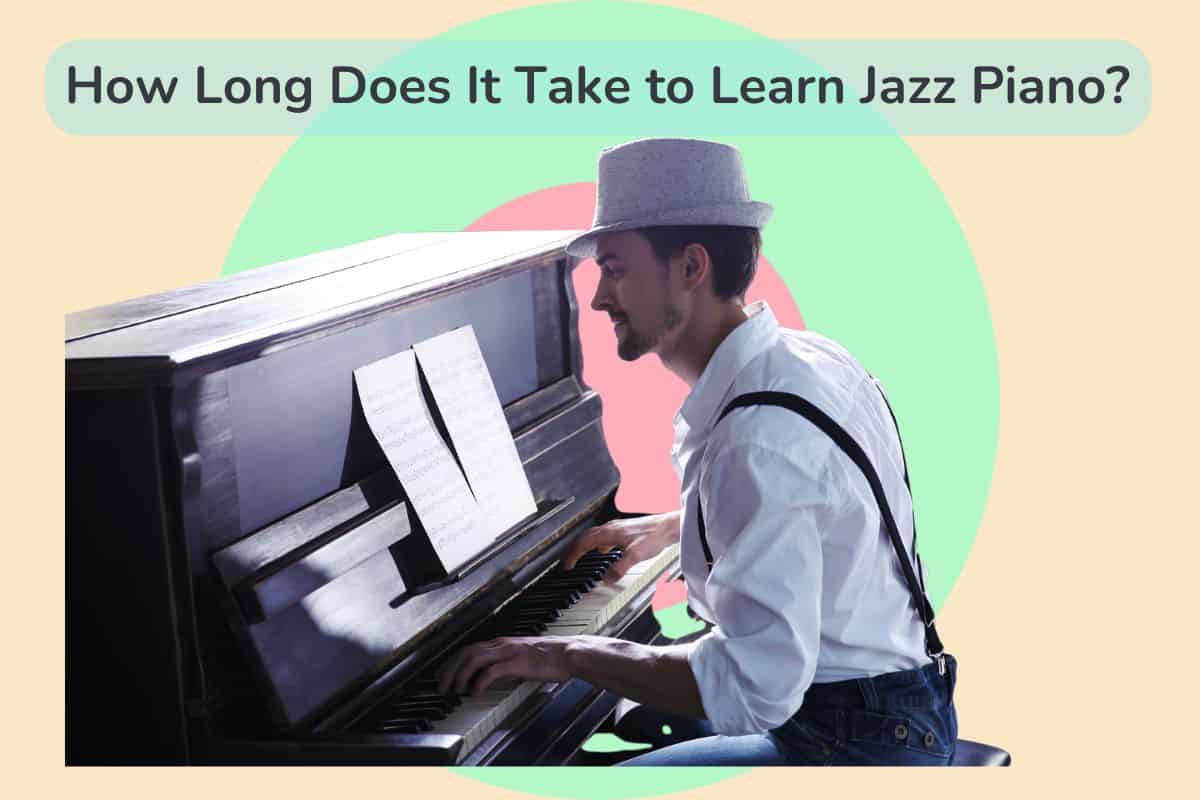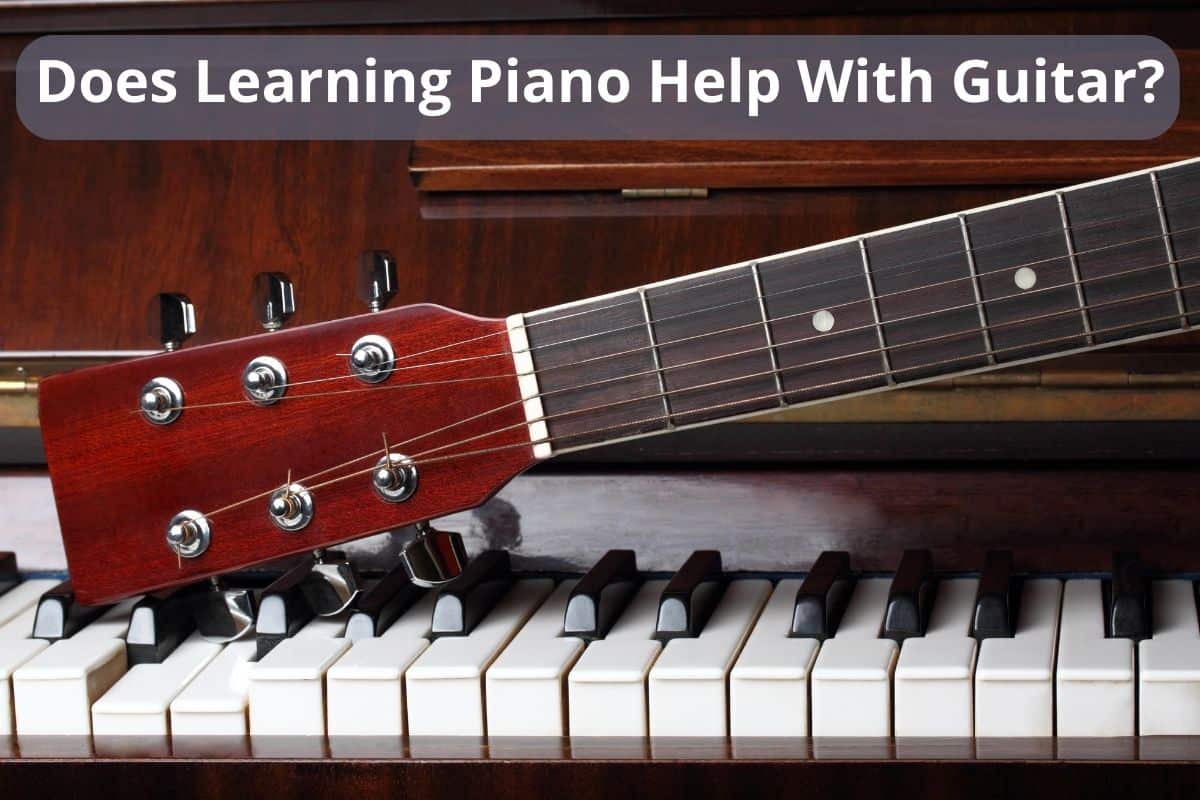Many people are interested in learning the piano but don’t know precisely what it would entail. Besides learning chords, scales, songs, etc., there are a few other factors to consider, along with a bit of psychology. Let’s take a look.
Learning the piano involves building hand coordination, muscle memory, chords, scales, and lots of practice to progress through the 4 levels of competence. Starting at the 1st level, where you don’t understand anything about the piano or how to play, advancing to where you can play as if it were second nature.
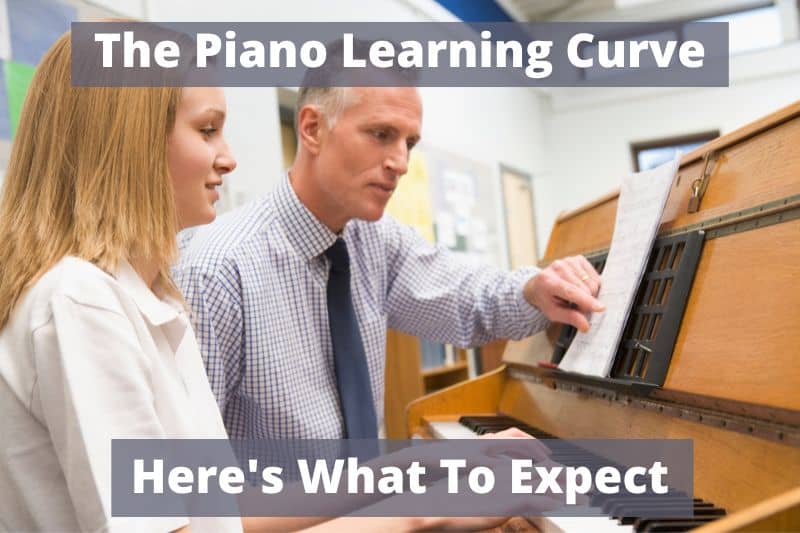
This article will detail the mental aspect and conscious levels of learning to play the piano instead of looking at what you will actually learn in music. Then we will look at how long it will typically take before you can expect to see results and if piano instructors and lessons are really worth it.
What are the Stages of Learning the Piano?
If you plan to learn the piano, then you will need to go through what is known as the four stages of competence levels. This psychological model for learning isn’t just for the piano but rather for learning any new skill and is based on the psychological process of progressing through a new skill from a beginner to a proficient level.
Martin M. Broadwell first introduced these stages of competence levels in 1969. Now I will discuss them and make them relatable to the piano. This will help you understand how your brain manages the process and the learning curve you will face when learning the piano.
The Four Stages of Competence Regarding the Piano
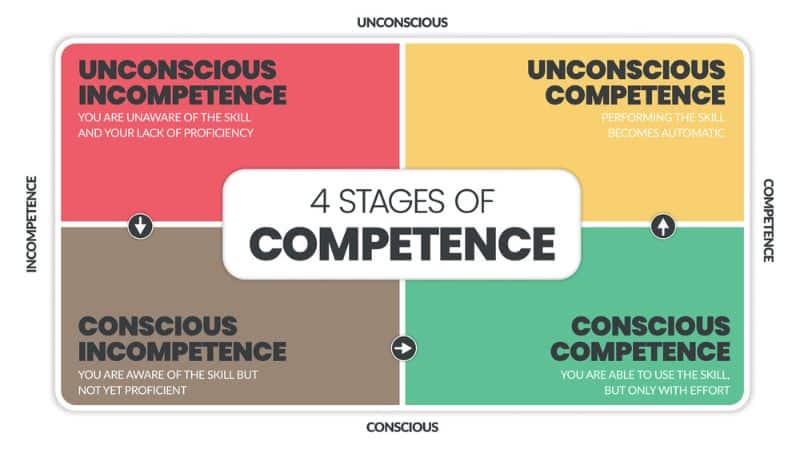
Unconscious Incompetence
The first stage of the competence model relates to the beginner’s complete lack of knowledge of the skill and the inability to apply that skill properly or to know how difficult that skill is. This first stage will last as long as you are ignorant of the overall skill level required to apply that skill proficiently. This means the stronger the incentive to learn, the shorter this stage will be.
In relation to the piano, it’s when a beginner sits down to play and doesn’t realize how involved the piano is, not knowing anything and not even being able to play.
When you start to play the piano, you can move from this stage relatively quickly because the piano is such a practical instrument. All the notes are fixed on the piano keys, and it’s much easier to make a tune than on a stringed instrument.
However, it still requires a lot of focus and coordination, like playing a sport. Once you sit down at the piano and understand that you need to play a particular piece of music but can’t, you will move on to the next stage.
Conscious Incompetence
The next level up is where people who start a new skill tend to quit because of the realization of what needs to be done. This is where you begin to understand how involved the skill is (in our case, piano) and the practice required to apply the skill correctly. Many people feel frustrated at this level, thinking they can’t achieve their goals or feel like they are not good enough.
In terms of the piano, you understand where you need to place your fingers to run a scale or play songs or chords. Still, your fingers don’t have the muscle memory to make the maneuvers correctly, and you keep making mistakes.
Depending on the amount of practice you put in and the level of proficiency you’re aiming for, competence at this level can last anywhere from a couple of weeks to many years.
When you’re in this stage, your piano progress will overlap with stage 3, Conscious competence. There will be various elements you will master, while with others, you will struggle.
Conscious Competence
This is the stage where you understand and know how to apply the skill. However, at this stage, performing the skill still requires a lot of concentration. As said before, this level will overlap with the previous one. Many steps and aspects of playing the piano are different (just because you can play one thing does not mean you can play another).
Relating this to the piano, you may be able to play a song but still have to concentrate very hard on the chord changes. However, you may struggle to play more complex pieces.
The same applies to other piano aspects, such as chords or scales. Perhaps you can move through chord changes relatively quickly but find playing scales with two hands more challenging.
Unconscious Competence
This is the final stage of the competence level model and is where you’ve had so much practice with the skill that it has become second nature. This is what everyone who sits down at the piano strives to achieve. Furthermore, the skill becomes ingrained into your playing. You can perform another task while doing it and teach others how to do it.
In piano terms, you can sit and play without thinking. Whether by ear or following a fellow musician telling you the chord changes or key the music is in, you can “improvise” and play on the fly.
How Long does it Take to See Results?
Everybody who wants to learn to play an instrument, especially the piano, always asks this question. The hard truth is it will take a considerable amount of time. Still, it is also relative to the amount of practice you put in and your natural ability.
You can expect to understand what you need to play in a moment of hearing a song or getting instructions from your teacher. Still, your fingers may be unable to do what your brain is telling them to do because of a lack of coordination, muscle memory, and experience.
Remember that you will sit in between the levels of conscious incompetence and conscious competence for the most part when learning the piano. At the level of conscious incompetence, vigorous diligent practice is required to see results and move on to the next level.
Take a look at Matt Southam, who took up piano at 30 and made a video detailing his progression through his first and second years above and below. You can see in the videos where Matt sits concerning the competence levels. As he progresses, you can see him becoming more comfortable but still need to concentrate hard when moving to a problematic section of a song. At the end of his second year, you can see that he is relatively comfortable playing a complex piece of music and is sitting at the conscious competence level.
After about two years, Matt gets his grade 4 in classical piano. He is approximately halfway through his training, roughly playing 900 hours of the piano. Breaking Matt’s practice time down, we can see that he practiced for about one and a half hours daily. This is a fair progression rate for a regular person. Still, it may vary depending on the person and the goals they wish to achieve when learning to play.
You may have a specific goal when you want to learn the piano. Perhaps you just want to learn a particular song or style. Maybe you want to learn chords to be able to play melodies and create your own pieces. You will need to consider this, which will drastically impact how long it will take you to see results.
How Much Should you Practice?
This is another question frequently asked by those who want to start learning and progress as quickly as possible. The main thing to remember is the more you practice, the better you will become, but consistency is always the key.
Some people, especially those learning at an older age, may not have a lot of time during the day to practice, so it is vital that they practice consistently rather than for an extended period followed by a long break between practice sessions.
For the most part, you should practice for at least half an hour a day to develop your musical skills and learn to love scales! Remember, your fingers must build motor skills, muscle memory, and coordination. This requires practice on a day-to-day basis. The cumulative effect of hours of practice on your brain pushes the skill to an unconscious level. Take note it is not uncommon for professional musicians to practice their instruments up to 15 hours a day, some even more.
Even though this amount of practice may be unreachable for most piano students, you must just remember that consistency and focus are the keys. You should practice for 30 minutes at a time. If you can do more, you will progress quicker.
Is it Hard to Learn Piano at an Older Age?
The two main things to consider with age and learning an instrument are time and muscle memory. Children have plenty of time to practice, and the tendons in their fingers are still supple and loose. This means they will not struggle as much when needing to place their fingers into a correct position.
Time factors make it tricky for adults, especially if you have a demanding job, family, or other commitments. However, it is still entirely possible to do so when aiming for achievable goals with focus and dedication.
As discussed previously, when practicing consistently for 30 minutes a day, you can learn the piano at almost any age.
Do You Need a Piano Teacher?
With the progress of technology, nearly everything, including piano tuition, can be found online and sometimes for free. Many piano teachers can be found on Youtube. There are also many apps that can guide you through the process. This can lead to many people wondering whether a teacher is necessary.
For me, though, I would say that if you’ve never played the piano before and have limited musical experience, then a teacher is essential.
The only time I would say that you don’t necessarily need a teacher is if you already play another musical instrument and have a solid background in music theory. This is because you could apply that theory to learning almost any new instrument. However, this may not be enough because you must ensure you learn good habits that a teacher can install.
A teacher will also know the finer details of playing the piano, like using a sustain pedal and knowing how something should sound. They will show you a better way to correct yourself or a piece of music you are trying to play and be there to share their knowledge.
In all honesty, if you wish to progress as fast as possible, a piano teacher would be your best bet to accomplish this. They will know the ins and outs of the piano as they have spent so many years trying to perfect their own skill. They can also show you which direction is best to take and where you should be applying your time when practicing.
Why are Piano Lessons Worth it?
As we already discussed, a piano teacher would be vital if you wish to progress your playing quickly. This means that lessons are most definitely worth it. Besides having a teacher who knows what they are doing, there are a few other factors to consider.
The first is accountability, which means that going to a weekly lesson will keep you in check and make you practice regularly. Having to show your skills weekly to your teacher will also keep you motivated.
The next thing to consider, which was touched on earlier, is an individual approach. This means that your teacher can create lessons that will cater to your goals and specific needs.
Having lessons is also great because, unlike books and online tutorials, you will be able to ask questions to your teacher. They can give you answers in real-time and help you understand problematic areas in your playing. This goes hand-in-hand with troubleshooting and ensuring you don’t develop bad habits.
Your instructor is also there to motivate you, set realistic targets, and help you with other aspects of the piano learning curve. These include avoiding repeating the same mistakes, developing the right sound, and helping you create good finger movements. They can also teach you music theory, which will help you understand music as a whole.
Having lessons will also help you open doors to new musical ideas. There are many instances where an individual takes lessons only wanting to learn one specific area of the piano, but after taking classes, they become open to different styles, genres, and playing techniques.
The last great thing about why piano lessons are worth it is that they will help you stay committed in the long run. Remember that consistency is the key, and learning the piano, like anything, can sometimes be very frustrating.
Are Online Piano Lessons Effective?
In this day and age, you can teach yourself almost anything online. You can also take online lessons where you and your instructor have cameras set up and conduct an online lesson via one of the many video apps.
For the most part, having an online lesson will be as beneficial as having an in-person class. There is no real difference, considering your equipment (video and sound) is high quality. If your piano teacher can see and hear your playing, then online lessons should pose no problem and, in some regards, are even better.
One of the many advantages of having an online lesson is that you will save time and money by not traveling. Additionally, you can organize it around your schedule and lifestyle with much more flexibility.
A study conducted via MIT (Massachusetts Institute of Technology) found that individuals who studied via online lessons showed success regardless of how much preparation and knowledge the student started out with.
This means if you are thinking about taking online lessons, you should. You’ll get a lot of the benefits in in-person classes but usually at a price that’s more cost-conscious.
Conclusion
The piano learning curve is much more than learning where to place your fingers and building muscle memory. Specific levels of consciousness play a role in learning and are no different from learning the piano.
Recognizing that consistency is critical when learning to play is essential. It will take considerable time and dedication to become proficient, regardless of age.
Lastly, having an influential teacher and taking regular lessons is an excellent way to start learning the piano. Even going as far as to say that online lessons are also an option as long as you have the correct equipment.
